- Home
- Norman, John;
Blood Brothers of Gor Page 9
Blood Brothers of Gor Read online
Page 9
"Let us return to the draw," said Cuwignaka, mounting up.
I joined him and, slowly, our kaiila at a walk, we returned to the narrow draw. Its floor was torn with the passage of the animals. Many of the hoofprints were six and seven inches deep.
"The animals were probably isolated in the other end of the draw," said Cuwignaka. "Then a bull was cut out and run down the draw, to be felled where we found him."
"Is that likely?" I asked.
"I think so," said Cuwignaka. "Sometimes animals take shelter in a draw, or, running into one, begin to mill, and, for a time, will stay there, sometimes until morning."
"It was a trap," I said.
"Not really," said Cuwignaka. "We were told to unharness the kaiila. We were told to picket them, in effect, at hand."
I nodded.
"No harm was intended to come to us," said Cuwignaka.
We then, on our kaiila, entered the draw, straightening ourselves on our kaiila as they descended the sloping entrance between the dirt sides.
"The meat is gone," said Cuwignaka, in a moment. "It is torn apart, destroyed, trampled, scattered."
Here and there I could see pieces of meat, trodden into the dust.
"We could save some of it," I said, "gather it and wash it later, at the camp."
"Leave it for the flies," said Cuwignaka.
"The travois, too, are destroyed," I said.
"Yes," said Cuwignaka.
The poles were broken and splintered; the crosspieces were shattered; the hides were rent. Bindings and harness were scattered about.
I surveyed the gouged floor of the draw, the trampled, half-buried meat, the remains of the travois. Many of the bones, even, of the animal on which we had been working were crushed and flung about. The carcass itself, most of it, had been moved several feet and flattened, and lay half sunk in the dust of the draw. The force of even a single kailiauk, with its speed and weight, can be a fearful thing. In numbers, it is awesome to contemplate their power.
Cuwignaka dismounted and began to gather in the rawhide bindings and pieces of harness from the shattered travois. They might be used again.
"I will help you," I said. I dismounted, and joined him. Our kaiila, not moving much, stayed close to us.
"The head is there," said Cuwignaka, indicating the head of the beast we had skinned, and had been fleshing.
"Yes," I said.
"When we are finished," said Cuwignaka, "we will take it out of the draw. We will take it up to the surface."
"All right," I said.
"Someone is coming," I said.
We looked down to the bend in the draw. About it, slowly, his kaiila walking, came a single rider.
"It is Hci," said Cuwignaka.
Hci halted his kaiila a few yards from us. He was naked save for the breechclout and moccasins. About his neck was the necklace of sleen claws. Across his thighs was his bow. At his left hip was his quiver. His arrows, extracted from their targets, the meat identified, at this time of day, would have been wiped clean of blood, even the lightning grooves inscribed in the long shafts. Stains would remain, of course, at the base of some of the feathers.
"Hou, Cuwignaka," said Hci.
"Hou, Hci," said Cuwignaka.
Hci looked about the draw. "You have lost the meat," he said.
"Yes," said Cuwignaka.
"That is not good," said Hci.
"No," said Cuwignaka.
"Your travois, too, have been destroyed," said Hci.
"Yes," said Cuwignaka.
"I told you the herd was too close," said Hci. "I told you to withdraw from this place."
Cuwignaka was furious, but did not speak. We knew that these words of Hci, to that extent, could be sworn to by Bloketu and Iwoso.
"But you did not listen," said Hci. "You chose, rather, to deliberately disobey a warden of the hunt."
"Why did you do this?" asked Cuwignaka.
"Now you have lost meat," said Hci.
"It is you who have destroyed the meat!" said Cuwignaka. "You have destroyed meat!"
Hci sat quietly on the kaiila. "I could kill you now, both of you," he said, "but I do not choose to do so."
I did not doubt but what Hci spoke the truth. We had only one knife with us, a cutting knife. Hci was mounted, and had his bow.
Hci then, quietly, rode towards us. When he reached our vicinity he stopped his kaiila. He indicated the head of the kailiauk. "That is to be taken out of the draw," he said. "Take it up to the surface."
"I will do so," said Cuwignaka.
Hci then, not hurrying, rode past us and made his way up the draw, some pebbles slipping back, on its slope, from the movement of his kaiila's paws.
We finished our work, coiling the rent harness and bindings from the travois. We slung them about our shoulders.
"I must leave the Isbu," said Cuwignaka.
"Why?" I asked.
"I am a shame to my brother," said Cuwignaka.
"This head will be heavy," I said. "If we are going to get it out of the draw, let us do so now."
"Yes," said Cuwignaka. We then, between us, carried the head up, out of the draw, and, some fifty yards or so from the draw, placed it on the level.
"Why are we doing this?" I asked.
"The kailiauk is a noble animal," said Cuwignaka. "Let the sun shine upon it."
"This is interesting to me," I said.
"What?" asked Cuwignaka.
"This business," I said.
"What business?" he asked.
"This business about the head," I said. "This was important, apparently, to both you and Hci, that it should be brought up from the draw, that it should be placed on the level, that it should be put, I gather, in the sun."
"Of course," said Cuwignaka.
"In this, do you not see," I asked, "you are both Kaiila, you no less than he. In the end, you are both of the Isbu."
"But I am a shame to the Isbu," said Cuwignaka.
"How is that?" I asked.
"I have lost meat," he said.
"You did not lose meat," I said. "Hci is the one who lost the meat."
"I guess you are right," said Cuwignaka. "No one, though, will believe it."
"Hci is well known in the camp," I said. "You may be surprised who might believe you, and not him."
"Maybe you are right," smiled Cuwignaka.
"You should not be distressed," I said. "You should be proud."
"Why is that?" asked Cuwignaka.
"You have brought four loads of meat back to the village. I doubt that anyone has done as well."
"That is pretty good, is it not?" said Cuwignaka.
"It is marvelous," I said.
"But men are stronger than women," said Cuwignaka. "They can cut meat better."
"But the men are needed for the hunt," I said.
"Yes," said Cuwignaka.
"And you are a man," I said.
"Yes," said Cuwignaka. "I am a man."
"Let us get the kaiila now," I said. "It is time to go back to the village."
"Four loads," said Cuwignaka. "That is pretty good, you know."
"It is marvelous," I assured him.
"I am ready to go back to the camp now," said Cuwignaka.
"Good," I said.
7
Bloketu and Iwoso Come Visiting
"He beat me," wailed Winyela, running up to me. "He beat me!"
"You are in the presence of a free man," I said, indicating Cuwignaka.
Swiftly she fell to her knees, and put her red hair to the dust. Her hair, sometimes braided, was now, as usual, unbraided. She, like most other slave girls, whether of the red savages or not, wore it long and loose. Among the red savages, of course, free women commonly braid their hair. The lack of braiding, thus, usually, draws an additional distinction between the slaves and free women of the red savages. The most common distinction, of course, is skin color, the slaves almost always being white and the free persons almost invariably being red. "Forgive me, Master," she said to Cu
wignaka.
"All right," he said.
She straightened her body, but remained on her knees, before us. "He beat me!" she said. She was naked, except for Canka's collar. Her small wrists were bound before her body, with several tight loops of a rawhide thong.
"Stand," I said, "and turn, slowly."
She did.
"Kneel," I said.
She knelt.
"Yes," I said. "There is little doubt about it. You have been beaten."
"It is not funny," she said.
"Apparently with a kaiila quirt," I said.
"Yes," she said. Some of the braiding marks were still visible in her flesh.
"I thought he liked me," she said.
"You are still alive," I pointed out.
"He took away my clothes, and tied me at a whipping stake, on my knees!" she said.
"That is not uncommon in camps of the red savages, for white female slaves," I said. "Besides you would not want your clothes bloodied."
She looked at me, angrily.
"Your hair was thrown forward," I said.
"Yes," she said.
"That is so it will not cushion the blows which might fall on your back," I said.
"Doubtless," she said.
"Too," I said, "you would not want to get blood on your hair."
"Of course not," she said.
"Do you think that you are the first girl who has ever been whipped?" I asked.
"No," she said.
"Apparently you did not spend all of your time on your knees, your hair thrown forward, your head and belly down."
"No," she said. "I was struck from my knees by almost the first stroke. I twisted and cried out. I must have supplied much amusement to the women of the red savages who were watching."
"They hate white slave girls," I said. "They enjoy seeing them beaten."
"Then I could cry out no more," she said. "I must simply lie there—"
"And take your punishment—?"
"Yes, and take my punishment—"
"As a slave—?"
"Yes," she said, "—as a slave."
I smiled. This was apparently the first full beating to which the former Miss Millicent Aubrey-Welles, the former debutante from Pennsylvania, had ever been subjected. It had not only physically punished her, and well, but, too, obviously, she had felt it as keenly humiliating. It had not only hurt her, but had horrified and scandalized her.
"You seem outraged," I said.
"I am," she said.
"Why?" I asked.
"I was beaten," she said.
"Do you find yourself eager for a repetition of the experience?" I asked.
"No," she said. "No!"
"The experience, then, was instructive?" I said.
"Yes," she said.
"Why were you beaten?" I asked.
"I cut meat poorly, out on the prairie," she said.
"Wasnapohdi warned you," I said. "You would not let her help. You would not listen."
Winyela squirmed angrily, on her knees in the dust, her small wrists bound tightly before her.
"You were displeasing," I said. "Be pleased that your punishment was not more severe than it was."
Winyela looked up at me, tears in her eyes.
"You might have been fed to sleen," I said.
She shuddered.
"Do you not realize, pretty Winyela," I said, "that you are only a slave?"
"He did not even give me back my clothes," she said.
"These are holiday times," I said. "Surely you have seen more than one white female slave naked in the camp."
"Yes," she said.
Whether slaves are clothed or not is, of course, up to the master. Most of the white female slaves in a camp, usually, are clothed. This is different from the girl herds, for there the women are kept naked except for their collars. Even in the camp, of course, one is likely to encounter stripped white female slaves, perhaps as a matter of discipline, or perhaps because their masters like them that way. At this time, however, in the time of the hunt and dancing, the feasting, and such, there were many more than usual stripped white female slaves in the camp. Several of these were slaves of the Isbu but others were brought in by the visiting bands, the Isanna, and the others. This probably had to do with pride, vanity, jubilation, high spirits, and such. The white female slave, in her way, particularly if she is a new slave, is a trophy in the Barrens, much as kaiila captured from white men, or such beasts captured from enemies might be. Accordingly, the red savages enjoy showing them off, exhibiting them, displaying them, as signs of their prowess, their success, their wealth. This practice seems to say, "Ho, this was a woman of the enemy! I brought her to my camp naked, on a rope, like a kaiila! I ran her hard beside my beast! She is rested now. I have not given her clothing! I keep her naked, like a kaiila! See her, behold her! She is pretty, is she not? She now belongs to me! I have made her my slave. See, my collar is on her neck! She is now mine to do with as I please. I am a better hunter and fighter than my enemy. I take his kaiila and his women, as it pleases me. I make them mine. I am so-and-so, of such-and-such a tribe, and of such-and-such a band!"
"He even left me bound," she said, lifting her secured wrists.
"That is perhaps a bit of extra discipline," I said.
"I am ashamed," she said. "I want to hide. Please let me go into your lodge."
I considered this.
"Beaten slave," said a white female, in a scandalously short shirtdress, and collar, a brunet slave of the Wismahi, sneeringly, to Winyela.
"You may enter the lodge," I said to Winyela.
"Thank you," she whispered, and crept within. Cuwignaka remained outside. He had pegged down three hides and, one after the other, alternating his efforts, was scraping them. All about the camp hides such as these, pegged down, and meat racks, heavy with sheets of kailiauk meat, were in evidence. These are common sights in summer camps. The meat is left two or three days in the sun, this being sufficient for its preservation. It is taken in at night to protect it from the night air.
Inside the lodge Winyela lay on her stomach, on the robes, and, her head lying on her bound hands, wept.
I could hear the sounds of the camp outside.
It was a time of festival.
There was laughter, and joking, the sounds of playing children, the calls of women, the shouts of men, the bustle of people moving about, many in their best, conversing, parading, visiting, occasionally the squeals of kaiila.
It seemed a shame that Winyela was so miserable. One might have hoped that, at this time, rather, in the bright afternoon, she would have been adorned and marched, clothed or unclothed, a rope on her neck, beside Canka's kaiila, he in his finery, that he might display her to the Isbu, and the other bands. Many of the young braves of the various bands were participating in this sort of promenade.
"Winyela," I said.
"Yes?" she said.
"Do you wish to be beaten again?" I asked.
"No," she said.
"Then, doubtless, you are resolving to be a better slave," I said.
She looked at me, tears streaming down her cheeks, her eyes red.
"Do not be so upset," I said. "You are only a slave."
"Canka struck me," she said. "He beat me."
"And well," I said.
"Yes!" she said.
"Did you expect to be displeasing with impunity?" I asked.
She regarded me, red-eyed.
"I see you did," I said. "Well, now you have learned better."
"I was beaten!" she said.
"Your sense of outrage is inappropriate," I said. "I suggest you rid yourself of it, immediately, lest it become the occasion of further discipline."
"Discipline?" she asked.
"Slave discipline," I said.
She swallowed, hard.
"Replace it with a suitable attitude of trepidation," I said. "You are only a slave."
I observed her naked flanks, on the robes.
She shuddered.
"You should not feel outrage," I told her. "You are only a slave. That is an emotion which would be more appropriate in a free woman, one, say, stripped, and unjustifiably beaten, as though she might be a mere slave. Beatings, on the other hand, are the due of slaves, particularly ones which are in the least respect displeasing, as they might be of any other owned animal."
"I might as well belong to anyone," she said, bitterly.
"That is true," I said. "But you belong to Canka."
"Yes," she said, bitterly. "I belong to Canka." She put her head down, weeping. "I'm so ashamed," she said. "I was so humiliated."
"I understand," I said. The females of the red savages, with their laughter and catcalls, in particular, would not have made the lovely slave's ordeal any easier. Too, that a given girl has been beaten, and has thus, presumably, failed to be fully pleasing in some way, makes her an object of contempt and ridicule among other girls. Little love is lost, commonly, between competitive slave girls. Girls commonly like seeing other girls being beaten, whom they think are too proud, or whom they don't like. It is almost a holiday in the slave quarters when a high slave is to be whipped, particularly if she is then to be reduced to the status of a common girl.
"Am I permitted to feel shame, humiliation?" she asked, angrily.
"Of course," I said. "Those are emotions which are permitted to slaves."
"How generous are the masters," she said.
"Too, shame and humiliation, like chains and whips, can be useful disciplinary devices."
"Of course," she said.
"A shamed, humiliated slave, tied and beaten, is usually swift thereafter to learn her lessons," I said.
"I do not doubt it," she said.
"Tell me truthfully now," I said. "During the beating itself, before you were alone, writhing with the pain, what did you find most shameful, most humiliating?"
"Must I answer?" she asked.
"Yes," I said.
"That I knew, in my heart," she said, "that I deserved the beating, that I richly deserved it."
"Oh?" I asked.
"I did not listen to Wasnapohdi," she said. "I was proud and vain. I was clumsy. I was stupid. I cut meat poorly. I displeased my master."
"I see," I said.
"Then I found myself stripped and tied on my knees at the whipping stake. I was to be publicly punished. Then the quirt fell upon me."
"Many times, in private beatings," I said, "such things as shame or humiliation will enter very little into the situation."

 The Emperor
The Emperor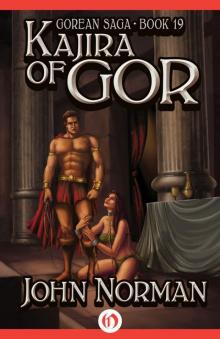 Kajira of Gor
Kajira of Gor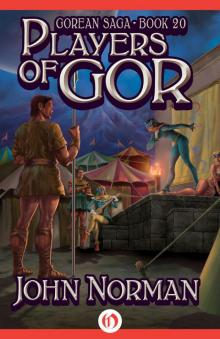 Players of Gor
Players of Gor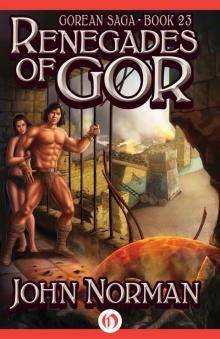 Renegades of Gor
Renegades of Gor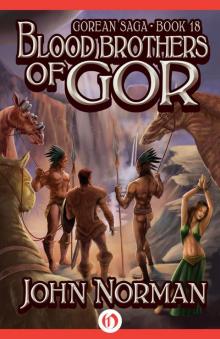 Blood Brothers of Gor
Blood Brothers of Gor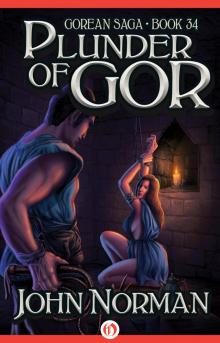 Plunder of Gor
Plunder of Gor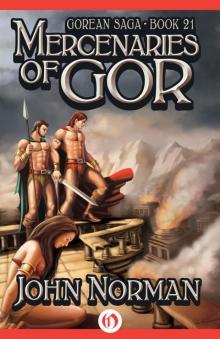 Mercenaries of Gor
Mercenaries of Gor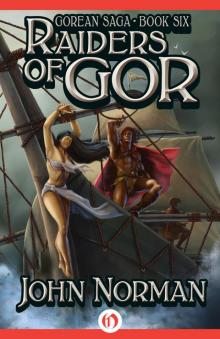 Raiders of Gor
Raiders of Gor Gor 30 - Mariners of Gor
Gor 30 - Mariners of Gor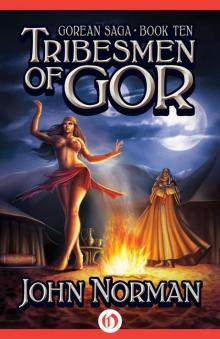 Tribesmen of Gor
Tribesmen of Gor Magicians of Gor
Magicians of Gor Mariners of Gor
Mariners of Gor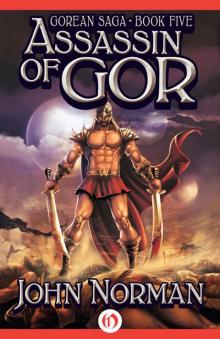 Assassin of Gor
Assassin of Gor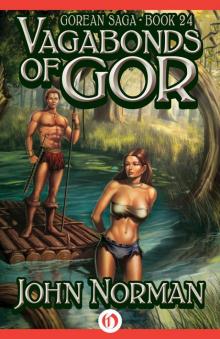 Vagabonds of Gor
Vagabonds of Gor